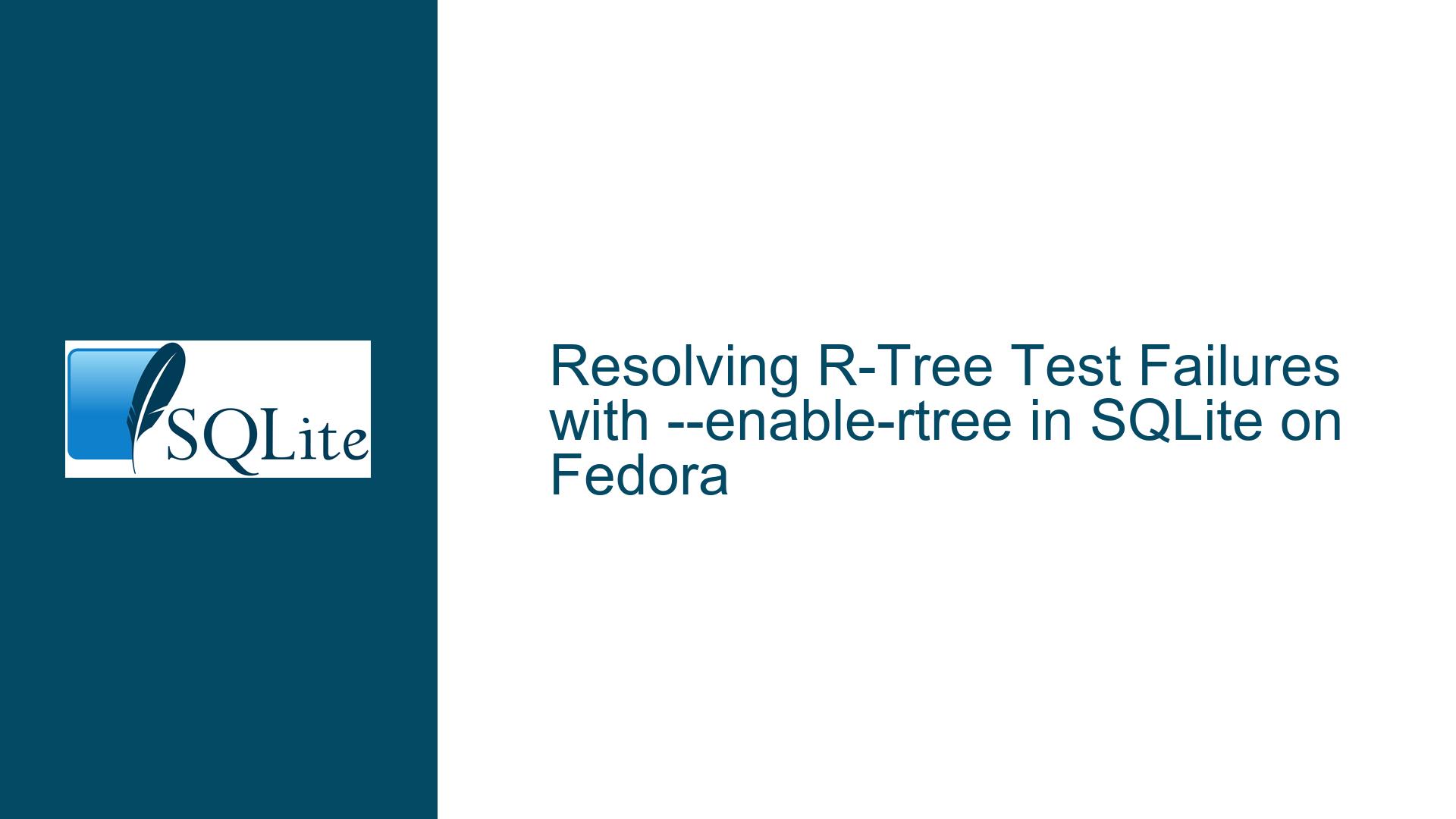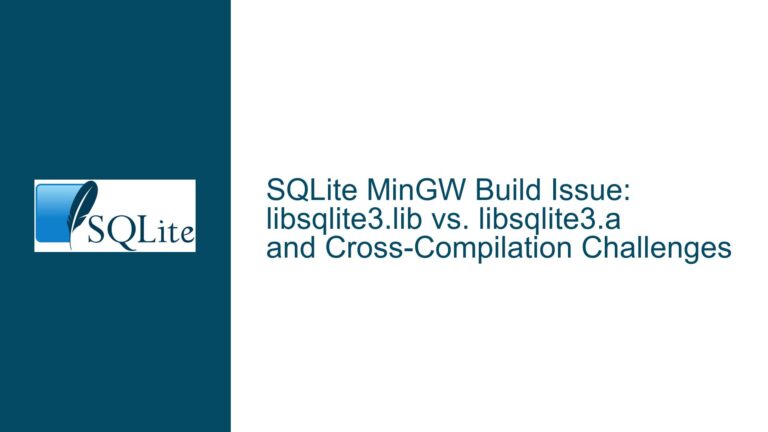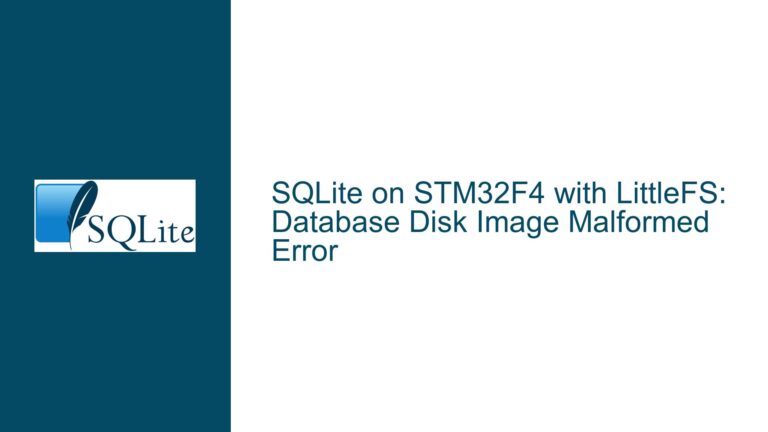Resolving R-Tree Test Failures with –enable-rtree in SQLite on Fedora
Issue Overview: Test Suite Aborts During R-Tree Module Validation
When building SQLite with the --enable-rtree configuration option, users may encounter test suite failures involving the rtreedoc and rtreedoc2 test cases. These failures manifest as abrupt termination with error messages such as alloc: invalid block and Aborted (core dumped), often accompanied by memory corruption indicators. The issue is particularly observed on Fedora 35 systems with Intel CPUs and TCL 8.6.10 installed. The failure occurs during the cleanup phase of R-Tree test logic, where memory allocated for test-specific structures is improperly released. This problem is not universal; it is environment-dependent and was initially challenging to reproduce across common platforms like Ubuntu, Windows, or macOS. The root cause lies in an undersized memory allocation within test infrastructure code—not the SQLite library itself—which interacts unpredictably with TCL’s thread-local memory allocator under specific conditions.
Possible Causes: Memory Allocation Mismatches in Test Infrastructure
1. Undersized Memory Allocation in R-Tree Test Logic
The SQLite test suite includes specialized code to validate R-Tree index behavior. A critical defect existed in the rtree_ptr() test function, which allocated 8 bytes for a structure requiring 16 bytes. This mismatch caused heap corruption when the test attempted to free the memory. The error remained latent on most platforms due to differences in allocator behavior. For example:
- System-Specific Allocator Alignment: Some allocators pad small allocations to 16-byte boundaries, masking the error.
- TCL’s Thread-Local Allocator: Fedora’s TCL implementation uses a custom allocator (
tclThreadAlloc.c) that tracks block sizes precisely. When the undersized block was freed, the allocator detected an invalid block header (corrupted by adjacent memory writes), triggering a panic.
2. Interaction Between SQLite Test Code and TCL Internals
The test suite (testfixture) relies on TCL for test execution. Memory allocated by the R-Tree test code (rtree_ptr()) was managed by TCL’s allocator. When rtree_ptr() allocated an undersized block:
- The test wrote beyond the allocated space, overwriting metadata used by TCL’s allocator.
- During database connection closure, TCL’s
TclpFree()detected the corruption viaPtr2Block()checks, leading toTcl_Panic()and process termination.
3. Platform-Specific Sensitivity in Memory Layout
Fedora 35’s default compiler flags, library versions, or kernel configurations exposed the defect where other environments did not. Factors include:
- Stack Protector Hardening: Fedora enables
-fstack-protector-strongby default, altering memory layout. - Address Space Layout Randomization (ASLR): Aggressive ASLR on modern Linux distributions could place the corrupted memory region in a location that triggers immediate detection.
- Debug Symbols in TCL: Fedora’s
tcl-develpackage might include assertions or debugging hooks absent in other distributions.
Troubleshooting Steps, Solutions & Fixes: Diagnosing and Resolving Heap Corruption
1. Diagnosing Memory Corruption in Test Suites
Step 1: Reproduce with Valgrind or Address Sanitizer
Run the failing test under Valgrind or with Clang’s Address Sanitizer (ASAN):
# Using Valgrind
valgrind --leak-check=full --track-origins=yes ./testfixture ext/rtree/rtreedoc3.test
# Using ASAN
export CFLAGS="-fsanitize=address -g"
make clean && ./configure --enable-rtree && make
./testfixture ext/rtree/rtreedoc3.test
Expected Output:
- Valgrind/ASAN reports an invalid free or heap-buffer-overflow at the
box_query_destroy()function, indicating a write to memory outside the allocated block.
Step 2: Inspect Test-Specific Allocation Logic
The failing test (rtreedoc3.test) uses a custom SQL function rtree_ptr(), defined in ext/rtree/rtree_ptr.c. Examine the allocation:
static void rtree_ptr(sqlite3_context *ctx, int nArg, sqlite3_value **apArg){
Box *pBox = malloc(sizeof(pBox)); // WRONG: sizeof(pBox) is 8 (pointer size)
// ... populate pBox ...
sqlite3_result_pointer(ctx, pBox, "Box", box_query_destroy);
}
Mistake: sizeof(pBox) returns the size of a pointer (8 bytes on 64-bit systems), not the Box structure. The correct code should use sizeof(Box).
2. Applying the Fix: Correcting Allocation Size
Modify the allocation in rtree_ptr.c:
Box *pBox = malloc(sizeof(Box)); // Correct allocation size
Verification:
- Rebuild SQLite with
--enable-rtreeand rerun the test suite. Thertreedoc3.testshould pass without heap errors.
3. Preventing Regressions: Testing and Environment Checks
Check TCL Library Consistency
Ensure tcl-devel (or equivalent) is installed and matches the runtime TCL version. Mismatched headers/libraries can cause allocator incompatibilities:
# Fedora
rpm -q tcl-devel
# Verify linkage
ldd ./testfixture | grep libtcl
Enable SQLite’s Internal Debugging Aids
SQLite includes optional assertions and debugging modes. Rebuild with:
export CFLAGS="-DSQLITE_DEBUG -DSQLITE_ENABLE_EXPENSIVE_ASSERT"
make clean && ./configure --enable-rtree && make
These flags enable expensive checks in the R-Tree module, such as verifying node bounds consistency after each operation.
Cross-Platform Validation
Test the fix on multiple platforms to confirm it resolves the issue universally. For Fedora-specific issues, use Docker to replicate the environment:
docker run -it fedora:35
dnf install -y tcl-devel make gcc
# Build and test SQLite
4. Understanding the Fix’s Mechanism
The corrected allocation (sizeof(Box)) ensures sufficient space for the Box structure, which contains two RtreeDValue arrays (typically 8 bytes each for aCoord[4] in a 2D R-Tree):
typedef struct Box Box;
struct Box {
RtreeDValue aCoord[4]; // 8 bytes * 4 = 32 bytes (for 64-bit doubles)
};
With the fix:
- Allocation Size:
sizeof(Box) = 32 bytes(vs. 8 bytes previously). - Memory Safety: Writes to
aCoordstay within the allocated block, preventing metadata corruption in subsequent allocator operations.
5. Addressing Subtle Interactions with Custom Allocators
TCL’s thread-local allocator (tclThreadAlloc.c) uses a block header to track allocations. The undersized block caused:
- Header Corruption: The
Boxstructure’s writes overflowed into the header of an adjacent block. - Validation Failure:
Ptr2Block()reads the corrupted header, detects an invalid magic number (0xEFEFin the log), and aborts.
The fix eliminates this overflow, ensuring TCL’s allocator can correctly validate all blocks during deallocation.
This guide provides a comprehensive pathway to diagnose, resolve, and validate fixes for R-Tree test failures linked to memory corruption in SQLite’s test suite. By addressing allocation sizing, platform-specific allocator behaviors, and validation practices, developers can ensure robust builds across diverse environments.






